胡適弔葉德輝末兩段
殺我者誰?共產黨。
我若當權還一樣。
當年我要殺康梁,
看來同是糊塗帳?
你們殺我我大笑。
我認你們作同調。
三十年中是與非,
一樣殺人來「翼教」。
日媒:中共決定剝奪薄熙來黨籍
更新時間 2012年8月26日, 格林尼治標準時間09:35

《朝日新聞》稱薄熙來可能會被追究刑事責任
日本大報《朝日新聞》周日(8月26日)在頭版報道,聚集在北戴河的中共領導層已決定剝奪中共前重慶市委書記薄熙來黨籍,追究他對前重慶市副市長王立軍投奔美國領事館的責任。
報道引述多名接觸過8月上旬參加北戴河會議的中共高層的人士透露說,北戴河還圍繞人大代表有不被逮捕的特權,準備剝奪薄熙來人大代表資格,顯示目前被軟禁在北京家中、接受中共中央紀律檢查委員會調查的薄熙來還面臨被追究刑事責任的可能性。《朝日新聞》形容薄熙來是中共前領導人鄧小平的寶刀薄一波的兒子,鄧氏家族也曾參與很多中共元老後代聯名要求黨中央從寬處分薄熙來的請願。
形勢未穩
報道說,剝奪薄熙來黨籍的決定,顯示了在北戴河中共為十八大推出新領導層的權力鬥爭中,胡錦濤派系佔了優勢,而處於下風的江澤民派系雖試圖以處分問題讓步做籌碼,換取新領導層人事妥協,但看來江澤民完全沒法顯示存在感、凝聚力低下。
《朝日新聞》周日還重申了今年5月該報披露胡錦濤有意恢復中共政治局常委7人的體制說,7人體制目前已獲支持,主要原因看來是主管司法、公安的周永康與薄熙來關係密切的問題,胡錦濤正在推進啟用共青團派系的人材。
《朝日新聞》分析說,剝奪黨籍是中共黨規五階段處分中最重的,不僅意味著薄熙來完全下台,而且也說明了胡錦濤派系對處分結論存在的重大影響。不過分析也說,雖然胡錦濤現在摘除了權力交接混亂萌芽,但只要中國社會對歪曲的現象不滿殘存,就存在變數的火種。
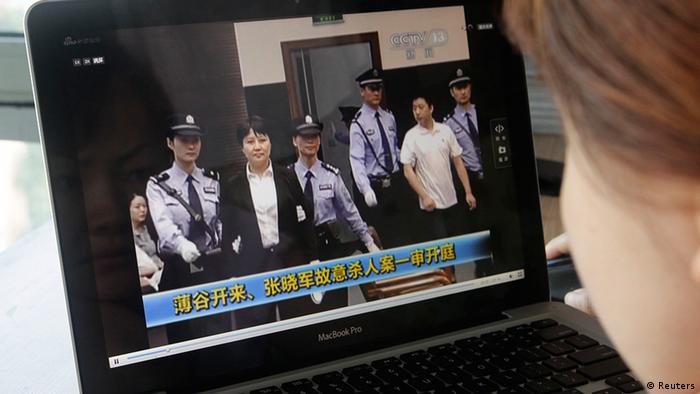
新华社昨日发表谷开来案庭审纪实,详细记录了谷开来案背景及庭审过程,但该文全程回避薄熙来,知名律师张思之认为,此案看似公开,实际根本没有审清楚。
(德国之声中文网)新华社8月10日发表长文"法律的尊严不容践踏 --
薄谷开来、张晓军涉嫌故意杀人案庭审纪实",文章详细透露庭审过程、谷开来谋杀动机和细节。但该文未提及薄熙来、薄瓜瓜证词以及海伍德是如何威胁薄瓜瓜的
细节等,文章也表示该案由王立军闯美使馆事件引发:"王立军私自进入美国驻成都总领馆滞留事件发生后,公安部对其反映的薄谷开来涉嫌杀害尼尔·伍德的问题
高度重视,成立了复查组。"
该文首先介绍庭审情况,除常规的控辩双方质证过程,最引公众热议的是在庭审即将结束时,谷开来做出最后陈述,表示"真是噩梦一场"。也强调在去年11月, 获悉薄瓜瓜 "危在旦夕",自己的精神"的确是崩溃了",此说与文章提及对谷开来已进行精神状态司法鉴定,表示谷开来曾因失眠、焦虑抑郁、偏执等接受治疗的精神障碍说 相应和。但公诉方也指,谷开来对本次作案行为性质和后果的辨认能力完整,控制能力削弱,应评定其具有完全刑事责任能力。
文章表示检控方宣读了谷开来的供述,其中杀人动机为,她和儿子薄某某同尼尔·伍德结识后,她曾介绍尼尔·伍德参与一公司的中介代理以及
参与一土地项目的前期策划,后尼尔·伍德因索要报酬等问题,与她及其子薄产生矛盾,并对薄某某进行人身威胁。文章指公诉人当庭出示了尼尔·伍德和薄瓜瓜的
多封往来电子邮件,薄谷开来供述称:"在我看来这已经不仅仅是威胁了,而是正在发生的事实,我必须拼死制止尼尔·伍德的疯狂"。
作案过程和王立军闯美使馆后,网络及海外媒体疯传和报道的相似,张晓军协助谷开来将尼尔·伍德约至重庆丽景度假酒店,当晚,薄谷开来在自己的住处准备了装 有含有氰化物的毒药的玻璃瓶和装有毒品胶囊的药瓶,交由张晓军携带,后薄谷开来进入房间与尼尔·伍德一起饮酒、喝茶,张晓军在外等候。薄谷开来趁尼尔·伍 德醉酒呕吐后要喝水之机,将张晓军交过的毒药倒入其口中,又将事先准备的毒品胶囊等物倒在房间地面上伪造现场,造成尼尔·伍德吸毒的假象。
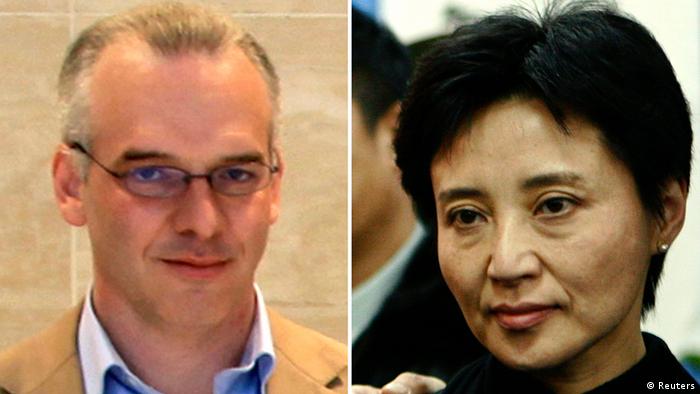 公开的"庭审纪实",谷开来亲手毒死海伍德
文章的最后还引述谷开来的辩护律师之一,安徽律师协会会长蒋敏表述:"司法机关保障了我们的律师会见权、阅卷权等权利,10多次会见了被告人,今天在法庭
上我也充分发表了辩护意见。";另引用旁听庭审的安徽大学法学院教授徐淑萍及中国人大代表郑晓燕、合肥市民蒋涛等人士评论,认为谷案庭审体现了社会主义法
治中国的法制尊严和权威。
公开的"庭审纪实",谷开来亲手毒死海伍德
文章的最后还引述谷开来的辩护律师之一,安徽律师协会会长蒋敏表述:"司法机关保障了我们的律师会见权、阅卷权等权利,10多次会见了被告人,今天在法庭
上我也充分发表了辩护意见。";另引用旁听庭审的安徽大学法学院教授徐淑萍及中国人大代表郑晓燕、合肥市民蒋涛等人士评论,认为谷案庭审体现了社会主义法
治中国的法制尊严和权威。
"薄熙来一家的故事胜过《教父》"
新华社关于谷案长文推出后,未在文章后开通评论通道,在多个网络社区和中国微博上转发该文的内容悉数被删。但多位网友在Twitter微博或隐去"敏感词"在国内微博上表达看法。
网友"Fusang"在Twitter上发出信息:"薄熙来、薄瓜瓜、王立军作为与本案有重大关系的人没有参演,这不是一个好庭审。"
新浪微博网友"BHC张明星"表示:"至少远在宋代,潘金莲毒杀武大郎,也能查明所用为砒霜,《水浒传》如描述为"毒药",就不好看 了。 "
网友"梅子2061"评论道:"女律师杀人案庭审后,看辩护律师的发言像在在背新华社通稿,想当年审判四人帮时律师业还可以对法院限制律师的行为表示遗憾,现在与时俱进啊!律师、公诉人和法官都和新华社高度一致不差分毫,赶上秦朝了!"
中国知名艺术家艾未未也在Twitter发表评论:"这才几年时间,'三个代表'就科学发展成'三步倒'了"、"在共同利益驱使下,利用公权集体疯狂伪造、掩盖犯罪事实,欺骗公众,是比投毒杀人更为严重的犯罪。"、"薄家族故事拍部电影的话,《教父》小巫见大巫。"
"我怀疑谷开来的开脱是为开脱别的人"
中国知名大律师、曾为当年江青案担任被告律师的张思之在接受德国之声采访时,认为新华社公开的"庭审纪实"中,多个关键性的问题并没有讲清楚,主要包括毒药从何而来、威胁邮件内容等。
他提出疑问,这些是控方的漏洞吗?"从法律角度来审查问题,根据我们的经验,毒从哪里来?谁提供的,这是非常重要的环节,提供毒品的人,应该说在这个案子里是从犯,为什么没有列入侦查的范围,更不要讲起诉了。"
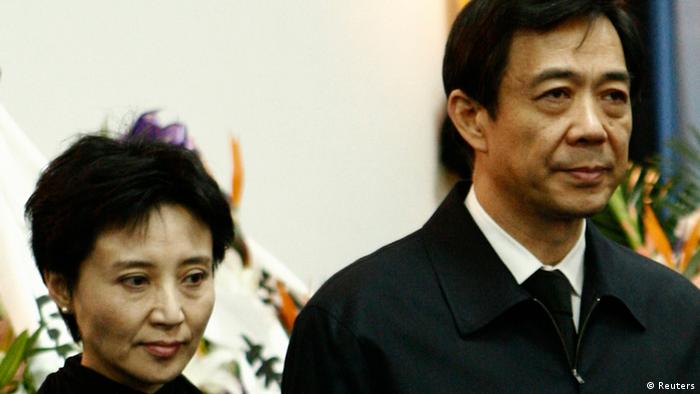 谷开来是为薄熙来开脱吗?
张思之也认为谷开来声称薄瓜瓜受到威胁一事,只是被告人对自己犯罪动机的说法:"你光说威胁不行,怎么威胁?什么样的威胁?我对这个威胁能达到致命的程
度,我是有怀疑的,这种说法实际是对自己的一种开脱。我不作为律师说话,我只作为一个自然人来说话,这种开脱我怀疑是开脱别的人。"
谷开来是为薄熙来开脱吗?
张思之也认为谷开来声称薄瓜瓜受到威胁一事,只是被告人对自己犯罪动机的说法:"你光说威胁不行,怎么威胁?什么样的威胁?我对这个威胁能达到致命的程
度,我是有怀疑的,这种说法实际是对自己的一种开脱。我不作为律师说话,我只作为一个自然人来说话,这种开脱我怀疑是开脱别的人。"
"结果不重要,重要的是审清楚"
此次新华社也称蒋敏为谷开来自行聘请律师之一,但与早前家人聘请北京律师沈志耕一说相矛盾。谷开来案与三十多年前的江青案有相似之处,律师在其中发挥的作 用,在张思之看来不尽相同:"会见10多次,我没有根据提出怀疑,但这个案子从宣布蒋敏做律师到开庭,一共几天时间,怎么会见这么多次,必要性在哪里?解 决什么问题?"
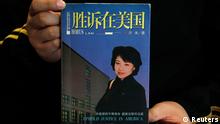 写下《胜诉在美国》的谷开来在中国“陨落”
张思之谈及整个案件过程和庭审过程,特别指出新华社长文中也指出是王立军闯馆是整个案件的引爆点,王立军究竟和这个案件有何关系?,这也是关键薄熙来事件
如何处理的关键之所在:"王立军在这个案子中的作用,直接影响到王立军在另一个案子当中居于什么样的角色,按照现在的作法,谷案不细审了,那就没办法
了。"
写下《胜诉在美国》的谷开来在中国“陨落”
张思之谈及整个案件过程和庭审过程,特别指出新华社长文中也指出是王立军闯馆是整个案件的引爆点,王立军究竟和这个案件有何关系?,这也是关键薄熙来事件
如何处理的关键之所在:"王立军在这个案子中的作用,直接影响到王立军在另一个案子当中居于什么样的角色,按照现在的作法,谷案不细审了,那就没办法
了。"
他认为根据目前所公布的案情来看,谷开来最大可能是被判处死缓,但认为如何判决并不是最重要的,而是要将案子审清楚:"你说已经审完了,但是审清没审清?这个老百姓也看得很清楚,不是一个通稿就能解决问题的,也不是一个判决就能解决问题的。"
作者:吴雨
责编:苗子
该文首先介绍庭审情况,除常规的控辩双方质证过程,最引公众热议的是在庭审即将结束时,谷开来做出最后陈述,表示"真是噩梦一场"。也强调在去年11月, 获悉薄瓜瓜 "危在旦夕",自己的精神"的确是崩溃了",此说与文章提及对谷开来已进行精神状态司法鉴定,表示谷开来曾因失眠、焦虑抑郁、偏执等接受治疗的精神障碍说 相应和。但公诉方也指,谷开来对本次作案行为性质和后果的辨认能力完整,控制能力削弱,应评定其具有完全刑事责任能力。
作案过程和王立军闯美使馆后,网络及海外媒体疯传和报道的相似,张晓军协助谷开来将尼尔·伍德约至重庆丽景度假酒店,当晚,薄谷开来在自己的住处准备了装 有含有氰化物的毒药的玻璃瓶和装有毒品胶囊的药瓶,交由张晓军携带,后薄谷开来进入房间与尼尔·伍德一起饮酒、喝茶,张晓军在外等候。薄谷开来趁尼尔·伍 德醉酒呕吐后要喝水之机,将张晓军交过的毒药倒入其口中,又将事先准备的毒品胶囊等物倒在房间地面上伪造现场,造成尼尔·伍德吸毒的假象。
 公开的"庭审纪实",谷开来亲手毒死海伍德
公开的"庭审纪实",谷开来亲手毒死海伍德"薄熙来一家的故事胜过《教父》"
新华社关于谷案长文推出后,未在文章后开通评论通道,在多个网络社区和中国微博上转发该文的内容悉数被删。但多位网友在Twitter微博或隐去"敏感词"在国内微博上表达看法。
网友"Fusang"在Twitter上发出信息:"薄熙来、薄瓜瓜、王立军作为与本案有重大关系的人没有参演,这不是一个好庭审。"
新浪微博网友"BHC张明星"表示:"至少远在宋代,潘金莲毒杀武大郎,也能查明所用为砒霜,《水浒传》如描述为"毒药",就不好看 了。 "
网友"梅子2061"评论道:"女律师杀人案庭审后,看辩护律师的发言像在在背新华社通稿,想当年审判四人帮时律师业还可以对法院限制律师的行为表示遗憾,现在与时俱进啊!律师、公诉人和法官都和新华社高度一致不差分毫,赶上秦朝了!"
中国知名艺术家艾未未也在Twitter发表评论:"这才几年时间,'三个代表'就科学发展成'三步倒'了"、"在共同利益驱使下,利用公权集体疯狂伪造、掩盖犯罪事实,欺骗公众,是比投毒杀人更为严重的犯罪。"、"薄家族故事拍部电影的话,《教父》小巫见大巫。"
"我怀疑谷开来的开脱是为开脱别的人"
中国知名大律师、曾为当年江青案担任被告律师的张思之在接受德国之声采访时,认为新华社公开的"庭审纪实"中,多个关键性的问题并没有讲清楚,主要包括毒药从何而来、威胁邮件内容等。
他提出疑问,这些是控方的漏洞吗?"从法律角度来审查问题,根据我们的经验,毒从哪里来?谁提供的,这是非常重要的环节,提供毒品的人,应该说在这个案子里是从犯,为什么没有列入侦查的范围,更不要讲起诉了。"
 谷开来是为薄熙来开脱吗?
谷开来是为薄熙来开脱吗?"结果不重要,重要的是审清楚"
此次新华社也称蒋敏为谷开来自行聘请律师之一,但与早前家人聘请北京律师沈志耕一说相矛盾。谷开来案与三十多年前的江青案有相似之处,律师在其中发挥的作 用,在张思之看来不尽相同:"会见10多次,我没有根据提出怀疑,但这个案子从宣布蒋敏做律师到开庭,一共几天时间,怎么会见这么多次,必要性在哪里?解 决什么问题?"
 写下《胜诉在美国》的谷开来在中国“陨落”
写下《胜诉在美国》的谷开来在中国“陨落”他认为根据目前所公布的案情来看,谷开来最大可能是被判处死缓,但认为如何判决并不是最重要的,而是要将案子审清楚:"你说已经审完了,但是审清没审清?这个老百姓也看得很清楚,不是一个通稿就能解决问题的,也不是一个判决就能解决问题的。"
作者:吴雨
责编:苗子
中國沒有解決“壞皇帝”問題China has banished Bo but not the 'bad emperor'
弗朗西斯•福山為英國《金融時報》撰稿
作者是斯坦福大學(Stanford)弗里曼•斯波利研究所(Freeman Spogli Institute)高級研究員
The writer is a senior fellow at Stanford's Freeman Spogli Institute.
For more than 2,000 years, the Chinese political system has been built around a highly sophisticated centralised bureaucracy, which has run what has always been a vast society through top-down methods. What China never developed was a rule of law; an independent legal institution that would limit the discretion of the government. What the Chinese substituted for formal checks on power was a bureaucracy bound by rules and customs that made its behaviour reasonably predictable, and a Confucian moral system that educated leaders to look to public interests rather than their own aggrandisement. This system is, in essence, the same one that operates today, with the Communist party taking the role of emperor.
2000多年來,中國政治體制的基礎一直是高度複雜的中央集權的官僚體制,這個官僚體制一直通過自上而下的方式管理著一個龐大的社會。中國從未建立起法治——可以限制政府的自由裁量權的獨立法律制度。中國沒有建立起正式的權力製衡機制,取而代之的是一個受各種規定及慣例約束的官僚體制,以及儒家道德體系。規定和慣例讓官僚體制的行為可以合理預測,儒家道德體系則教育領導人要考慮公共利益,而不能只顧個人權勢膨脹。今天運行的體制在本質上也是如此,皇帝的角色由共產黨充任。The issue Chinese governments have never been able to solve is what was historically known as the “bad emperor” problem: while unchecked power in the hands of a benevolent and wise ruler has many advantages, how do you guarantee a supply of good emperors? The Confucian educational system and mandarinate was supposed to indoctrinate leaders, but every now and then terrible ones would emerge, such as “the evil Empress Wu”, who killed off much of the Tang dynasty aristocracy, or the Ming dynasty's Wanli Emperor, who in a fit of pique refused to come out of his palace or sign documents for nearly a decade.
中國政府一直無法解決的是歷史上被稱為“壞皇帝”的問題:不受制約的權力如掌握在一位仁慈且明智的統治者手裡,會有很多好處,但如何保證好皇帝會源源不斷地出現?儒家教育體系和官僚政府本應教化領導人,但壞皇帝仍不時出現,例如“邪惡的女皇武則天”,她殺死了唐朝很多貴族,或者明朝的萬曆皇帝,他曾一怒之下,近30年不上朝、不批奏摺。In the view of many Chinese, the last bad emperor to rule China was Mao Zedong, who unleashed unspeakable suffering on the people, and whose power could not be checked until his death in 1976. The current rules governing decision-making and leadership at the very top of the party reflect this experience: responsibility is shared among the nine members of the standing committee of the politburo; there are 10-year term limits on the tenure of the president and prime minister; no one over the age of 67 can be considered for membership on the standing committee. These rules were designed to prevent the rise of another Mao, who could use his personal authority to dominate the party and the country. China's authoritarian system is thus distinct because it follows rules regarding term limits and succession.
在很多中國人的眼裡,最後一個統治中國的壞皇帝是毛澤東,他給中國人造成了無法言說的痛苦,而且在1976年去世之前,他的權力一直不受制衡。目前制約共產黨最高層決策和領導權的規則,反映了從這段歷史中吸取的教訓:政治局常委9名委員共同承擔責任;國家主席和國務院總理的任期為10年;67歲以上的人不納入政治局常委委員的考慮範圍。這些規則是為了防止有人利用個人權威主宰整個黨和國家,防止另一個“毛澤東”的崛起。因此,中國的威權體制很獨特,因為它遵從關於任期限制和繼任的規定。This is why the recently purged Bo Xilai was such a threat to the system. Using his base in Chongqing, he used the media to build up his own authority, which was strong already given his status as a princeling, or son of a revolutionary hero . He was ruthless in the use of state power to go after not just criminals and corrupt officials but businessmen and rivals who had accumulated too much power and wealth. He revived Mao-era mobilisation tactics such as the singing of revolutionary songs at rallies. Unlike his grey compatriots, he could have dominated the CPC leadership through an independent power base had he been promoted to the standing committee. It therefore makes sense that Hu Jintao and the leadership should use the scandal to eliminate him from consideration and remove the bad emperor before he ascended to the throne. The incident has revealed a deep problem in China – the lack of formal institutions and of a real rule of law. The rules the Chinese leadership follows are neither embedded in the constitution, clearly articulated, nor enforced by a judicial system. They are internal rules of the CPC, which have to be inferred from its behaviour. Had Mr Bo succeeded in getting on to the standing committee, he could have overturned them.
最近被整肅的薄熙來之所以對這一體制構成了重大威脅,原因就在於此。憑藉在重慶的基地,他利用媒體加強自己的權威。鑑於他是“太子黨”,即革命英雄之子,他的權威本來就很強大。他無情地利用政府權力,不僅調查犯罪分子和受賄官員,還對那些積累了太多權力和財富的商人和競爭對手窮追不捨。他恢復了一些毛澤東時代發動群眾的手段,例如集會唱紅歌。與其他平淡無奇的中國高官不同,一旦進入政治局常委,他可能會通過一個獨立的權力基礎控制共產黨的領導層。So the apparent institutionalisation of the Chinese authoritarian system is largely a mirage. The CPC has not solved the bad emperor problem, nor will it until it develops something like a genuine rule of law with all of the transparency and formal institutionalisation that entails.
因此,難怪胡錦濤和中共領導層會利用醜聞的機會將薄熙來清理出局,搶在這位壞皇帝登基之前將他除掉。此事暴露了中國的一個深層次問題——缺乏正式的制度和真正的法治。中國領導層遵循的規則既不是憲法中明確規定的規則,也不是司法系統執行的規則。他們遵循的是中共內部規則,只能從中共的行為中去推斷。如果薄熙來成功進入中央政治局常委會,他可能推翻這些規則。I had a meeting a couple of years ago in Beijing with a mid-level official heading a central committee office, who told me over a long lunch that I could not possibly understand China without appreciating what a total disaster the cultural revolution had been, and how the current system was organised to prevent that from happening again. Looking around at the books and memorials to Mao that the CPC was still promoting, I asked him whether that could happen until the party told the truth about Mao's legacy. His generation had personal experience of those terrible events, but people growing up since then did not, and could be seduced into viewing it with nostalgia. It was precisely that lack of historical remembrance Mr Bo was exploiting. The official did not have an answer to my question.
因此,中國威權制度表面上的製度化,在很大程度上是假象。中共沒有解決壞皇帝的問題,要解決這個問題,中共首先需要發展真正的法治,實現政治透明化,建立起正式的製度。So in the end, informal rules observed by a small clique of insiders cannot really substitute for a formal rule of law. As we can see today, modern liberal democracies constrained by law and elections often produce mediocre or weak leaders. Sometimes democracies elect monsters, such as Adolf Hitler. But at least the formal procedures constraining power through law and elections put big roadblocks in the path of a really bad emperor. Despite having beaten back Mr Bo's challenge in the short run, the Chinese system has not solved this institutional problem yet. It now has a real opportunity to do so, which I hope the new leadership coming into power will take up.
幾年前,我在北京與一位掌管某中央委員會辦公室的中級官員吃午餐,聊了很長時間。他告訴我,不理解文化大革命是怎麼樣的一場浩劫,不理解當前有什麼樣的制度安排來阻止文革重演,我就不可能理解中國。我看了看周圍那些中共仍在推崇的關於毛澤東的書籍和紀念品,問他,在中共對毛澤東的功過作出真實評價之前,文革那樣的事情是否還有可能發生?他那一代人對文革的可怕有切膚之痛,但成長於文革之後的中國人沒有,他們可能被鼓動,對文革產生一種懷舊情緒。薄熙來利用的正是這種對歷史的遺忘。那位官員沒有回答我的問題。
所以,一小群內部人遵循的非正式規則,最終不能真正取代正式的法治。如我們今日所見,受到法律和選舉約束的現代自由民主制度常常產生平庸或懦弱的領導人。有時候民主制度會讓惡魔當選,比如阿道夫•希特勒(Adolf Hitler)。但至少正式的程序通過法律和選舉制度對權力構成了約束,在真正的壞皇帝登基之路上放了一塊大大的攔路石。儘管在短期內消除了薄熙來的威脅,但中國的現行體系還未解決這個制度性問題。中國現在有現實的機會來解決這個問題,我希望即將上台的新領導層抓住機會。
譯者/何黎
China security chief down but not out after blind dissident's escape
BEIJING |
(Reuters) - Strike two against China's once invulnerable domestic security chief, Zhou Yongkang.An audacious escape by blind dissident Chen Guangcheng is the second uproar this year to hit Zhou, who has expanded China's policing apparatus into a vast, costly and - now for all the world to see - a flawed tool of Communist Party control.
But even one of the biggest domestic security embarrassments in more than a decade is unlikely to knock him out before a party congress late this year that will appoint successors to him and other retiring leaders, said several experts.
The question will be whether his successor gets to rethink his legacy and rein in the domestic security establishment whose $110 billion budget exceeds the People's Liberation Army's.
Chen outfoxed a cordon of guards and security cameras to flee home imprisonment in Shandong province in east China, escaping to what supporters have said is U.S. protection in Beijing. His feat was a rebuff to Zhou's security forces and it threatens to turn into a standoff with Washington.
Zhou was already bruised by a scandal in Chongqing in southwest China, after that city's former police chief, Wang Lijun, fled into a U.S. diplomatic compound in February for more than 24 hours. Wang revealed allegations of murder and corruption that have felled Bo Xilai, the ambitious Chongqing party chief who had courted Zhou as a patron.
The domestic security establishment was humiliated in 1999, when members of the Falun Gong spiritual movement held a surprise protest around the party leaders' compound in Beijing. Although smaller in scale, the two latest incidents are also embarrassing setbacks for the guardians of stability.
"All of the recent astonishing episodes - police brutality in Chongqing and Shandong, Wang Lijun's rise and his attempted defection to the U.S. consulate, and Chen Guangcheng's adventurous escape - have revealed severe flaws of the Chinese security system," said Cheng Li, an expert on Chinese politics at the Brookings Institution in Washington D.C.
"Zhou Yongkang, as the leader in charge of this functional area, deserves some blame," Li said in emailed comments.
EXTREME CAUTION
But Li added that China's top leadership was extremely cautious and hesitant to fire more senior leaders, especially someone whose status was even higher than Bo.
Since 2007, Zhou has been the member of the Politburo Standing Committee - the party's core council of power - who steers the police, law and security agencies.
The recent crises have intensified long-standing criticisms in China that Zhou's fiefdom has grown too powerful, unaccountable and yet incapable of meeting the party's expectations of defending social stability.
"You can't separate the case of Chen Guangcheng from Zhou Yongkang and his making stability preservation a national policy that has overridden all boundaries and rules," said Pu Zhiqiang, a lawyer in Beijing who takes on contentious cases about human rights and freedom of speech.
"This all comes down to Zhou Yongkang's policies for social control and domestic security, and this shows that in the end they can't work," added Pu, who said he hoped China's next leaders would rein in what they call the "stability preservation" apparatus after taking power from later this year.
Despite Internet-fed rumors that Zhou could fall because of ties to the disgraced Bo, he remains a hulking presence in politics. His recent regular appearances and speeches appear intended to show he remains out of political danger.
Zhou, 69, must retire at the forthcoming party congress, and ousting him before then could fan panic discord at a vulnerable time, said Xie Yue, a professor of political science at Tongji University in Shanghai. Xie studies domestic security.
"It is rumored that Zhou Yongkang has been under pressure internally, and the Chen Guangcheng incident offers more reasons to criticize him," Xie said in a telephone interview.
"But the priority is a smooth transition for the 18th Party Congress, and if Zhou Yongkang was ousted before then, that could be too much of a shock for the handover of power by the top levels of the Communist Party," said Xie.
A $9.5 MILLION BILL TO LOCK UP CHEN
For 19 months, Chen Guangcheng endured extra-judicial home jail in his village, a living symbol of the Communist Party's willingness to mobilize enormous resources to stifle the dissent and protest that it fears could challenge its power.
Chen, a self-schooled legal advocate who campaigned against forced abortions, had been held in his village home in Shandong province since September 2010 when he was released from jail for charges that he called spurious.
Chen's supporters have described a relentless effort to keep him locked up, while maintaining the official fiction that he was free. Squadrons of guards patrolled his Dongshigu village to keep him in and unwelcome visitors, including reporters, out.
A web of security cameras watched his home.
Officials told Chen they estimated well over 60 million yuan ($9.5 million) had been spent to keep him penned up, he said in a video released after his escape, adding that sum did "not include cash for paying off senior officials in Beijing".
"It's clear just how serious the corruption was, and how badly money and power have been abused," Chen said in the statement addressed to Chinese Premier Wen Jiabao and carried on YouTube. Chinese officials and police have refused to answer repeated questions from reporters about Chen and his comments.
His confinement was just part of a much larger "stability preservation" campaign to deter threats to party power. Chinese spending on police, militia and other domestic security arms will increase by 11.5 percent in 2012 to 701.8 billion yuan, according to the budget approved in March.
By comparison, China's defense budget for 2012 is 670.3 billion yuan.
The security spending surge has inflated the power of the police and militia forces under Zhou, an avid supporter of President Hu Jintao's campaign to strengthen "social management" and pre-empt unrest.
"Every province, every place has its own Chen Guangchengs, people who are kept under control and silenced without any legal basis or appeal," said lawyer Pu. "Chen Guangcheng was the most prominent example of this unfettered abuse of power."
RETHINKING?
Echoing the views of many liberal supporters of rule of law, Pu said he hoped the setbacks to China's domestic security agencies would give the country's next generation of leaders impetus to tether their power more tightly. Vice President Xi Jinping is expected to replace Hu as party chief and president.
"The next generation of leaders can make a break, and use these incidents to make their case," he said. "The stability preservation sector is a powerful interest group, but if leaders are determined to change it, it won't be able to resist."
There is uncertainty about who will succeed Zhou as domestic security chief. He was a provincial leader with a background in oil, and his successor could be another provincial boss.
Still, the standoff over Chen's fate is unlikely to force leaders to fundamentally revise their entrenched security policies, said several experts.
"I'm not optimistic that there will be much change. The whole model of stability preservation is part and parcel of the mode of rule, not the work of just one man," said Xie.
"Zhou Yongkang will retire, but the stability preservation model will not."
(Editing by Brian Rhoads and Mark Bendeich)
Britain Presses for Information on Death in China
By JOHN F. BURNS
The British government is suddenly demanding more information in the
case of Neil Heywood, a British businessman who was believed murdered in
China last year and had ties to Bo Xilai’s family.
新華社評薄熙來事件警告勿濫權
更新時間 2012年4月18日, 格林尼治標準時間03:05

中國官方媒體就薄熙來事件發表評論。
中國官方媒體新華社周二(4月17日)晚間發表英文評論,稱薄熙來事件給官員濫用權力的行為敲響警鐘。
文章對王立軍事件、英國公民海伍德之死以及薄熙來違紀發表評論。英文評論
文章稱對相關事件的處理反應了中國共產黨「嚴格執行法律與黨紀的意願,對待腐敗絕不容忍,以保持黨的純潔性」。
文章提到,中國共產黨面臨著執政、改革開放、市場經濟以及外部環境的長期考驗,同時存在精神懈怠、能力不足、脫離群眾以及消極腐敗的危險。
「薄熙來事件向全體黨員宣告,無論處於什麼職位,永遠不能凌駕於黨紀和法律之上,不能忽略權力來自於人民、必須為人民服務這一基本事實。」
文章最後說,任何人都不可能利用職務便利謀取個人利益而不受到處罰。稱從這個意義上來講,「對薄熙來事件的調查可以解讀為一項加強權力監督的舉動」。
重慶呼應
據重慶日報報道,主管幹部任命的重慶組織部官員呼籲「嚴肅換屆紀律」,迎接中共18大的召開。重慶市委常委兼組織部長徐松南呼籲發揮幹部監督機制效用,「抓好對領導班子、領導幹部和幹部選任全過程的監督」。
報道引述徐松南說,對領導幹部的監督要突出「一把手」的重點,他抨擊個別「一把手」凌駕於組織之上,獨斷專行、任人唯親。
新華社轉發了重慶日報的這篇報道。
Bo Xilai
Shattering the façade
Further twists emerge in the demise of Bo Xilai's political career (108)中国政府双拳出击论“不厚”
薄熙来事件前后,中国网络中又出现了许多敏感词。香港学者观察到,政府现在“管理”媒体的政策是“双拳出击”,两手都硬。
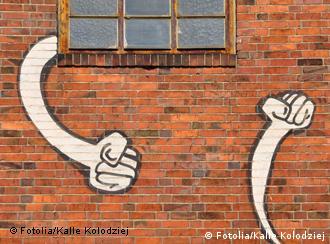 防火墙的这边,是中国政府两手都硬的"媒体管理"
防火墙的这边,是中国政府两手都硬的"媒体管理"
(德国之声中文网)从王立军出走美国领事馆开始,康师傅、西红柿、火锅便不再仅仅是食品的代名词。聪明的中国网民在互联网上发明了各种词汇,用于绕开官方
的网络管制讨论时政话题。"康师傅"的背后是周永康,而里外通红的"西红柿"则是薄熙来和他领导下的重庆市的代号。除此以外,网民还为刚刚走下中国政坛的
薄熙来取了"不厚"、"西南王"、"渝督""厚东去"这样新网名。但据《中国数字时代》(China Digital
Times)报道,这些网民创造的新词也逐渐的被网络管理系统屏蔽。一些与薄熙来事件有关的词汇,例如纪委、立案、调查、尼尔、英国+商人英国+保姆都在
被屏蔽的行列。
香港大学中国媒体项目网站主编班志远(David Bandurski)认为,在观察薄熙来事件前后中国政府的媒体策略时,不应该只看到互联网上的审查,而是应该看到中国整体对媒体管制的水平。
中国官方媒体在第一时间公布了三篇关于薄熙来的文章。第一篇通报了中央政府决定停止薄熙来担任的中央政治局委员职务的消息。第二篇就是关于英国商人尼尔· 伍德死于他杀,薄谷开来及其勤务人员张晓军有重大作案嫌疑的消息。第三篇是《人民日报》于消息公布当天晚上发表的社论。这三篇文章几个小时后出现在了中国 各大门户网站上,并长时间占据了主要的位置。在班志远看来,这是中国政府采取主动,利用有商业性质的网站传播信息的一个例子。他指出,中国政府利用这些网 站大力推广自身想传达的信息,而这背后不能不说有其政治考量。而加入其中的不仅仅是党报和一些官方色彩很浓的媒体机构,许多城市一级的商业报刊也竞相刊登 了这三篇具有主导作用的文章。包括一向以独立、敢言著称的《南方都市报》。该报于当天早晨用整个头版的面积刊登了这三篇文章。班志远认为:"这直接体现了 胡锦涛2008年提出的,不仅仅要对互联网媒体进行监管,还要主动对其加以利用的说法得到了实践。其中也包括对地方商业性媒体机构的利用。所以我觉得不能 把政府对互联网媒体的监管和对传统媒体的监管分开说。"
两手抓,两手都要硬
出于学术研究需要,时刻关注中国媒体发展状况的班志远指出,像博客、论坛以及微博这样的社会网络媒体是中国民众目前唯一可以参与公共讨论的地方。但中国的 网络监管机构现在似乎没有采取一刀切的办法,将所有包含敏感词的信息屏蔽。而是根据信息的内容有选择的对其进行删除。加上政府通过传统官方媒体大力推广它 们想要推广的内容。人们在其中可以看到中国政府"双拳出击"的策略。
同时,他也观察到在薄熙来被停职以后,中国的许多传统报刊纷纷发表社论,向中央政府表达自己的忠诚。包括《北京日报》以及《人民日报》4月12日发表的关 于重庆的文章。基本上就是说重庆市委市政府以及重庆市人民都坚决拥护中央的领导。这样的社论现在大量出现在中国所有的官方媒体中。包括中央电视台4月11 日的《新闻联播》节目中也出现了这三篇主导性文章。随后,该节目又播出了采访地方官员、学者、律师照本宣科般"表忠心"的片断。班志远表示,在现代媒体中 还能看到这样的镜头,确实出乎他的意料。
"这看上去确实有点历史倒流的意思。整个宣传攻势有一点文化大革命的味道。而这也有一定的讽刺意义。因为总理温家宝在最近的讲话中表达了他反对薄熙来的立 场,提醒人们警惕文化大革命精神回归的危险。但民众最近在像《新闻联播》节目中的确可以看到文化大革命的影子。有一个微博用户说,当他第一次听说温家宝提 及文化大革命还有可能发生的时候,他并不相信。但看了昨天晚上的新闻联播,他相信了。"
作者:任琛
责编:石涛
中国官方媒体在第一时间公布了三篇关于薄熙来的文章。第一篇通报了中央政府决定停止薄熙来担任的中央政治局委员职务的消息。第二篇就是关于英国商人尼尔· 伍德死于他杀,薄谷开来及其勤务人员张晓军有重大作案嫌疑的消息。第三篇是《人民日报》于消息公布当天晚上发表的社论。这三篇文章几个小时后出现在了中国 各大门户网站上,并长时间占据了主要的位置。在班志远看来,这是中国政府采取主动,利用有商业性质的网站传播信息的一个例子。他指出,中国政府利用这些网 站大力推广自身想传达的信息,而这背后不能不说有其政治考量。而加入其中的不仅仅是党报和一些官方色彩很浓的媒体机构,许多城市一级的商业报刊也竞相刊登 了这三篇具有主导作用的文章。包括一向以独立、敢言著称的《南方都市报》。该报于当天早晨用整个头版的面积刊登了这三篇文章。班志远认为:"这直接体现了 胡锦涛2008年提出的,不仅仅要对互联网媒体进行监管,还要主动对其加以利用的说法得到了实践。其中也包括对地方商业性媒体机构的利用。所以我觉得不能 把政府对互联网媒体的监管和对传统媒体的监管分开说。"
两手抓,两手都要硬
出于学术研究需要,时刻关注中国媒体发展状况的班志远指出,像博客、论坛以及微博这样的社会网络媒体是中国民众目前唯一可以参与公共讨论的地方。但中国的 网络监管机构现在似乎没有采取一刀切的办法,将所有包含敏感词的信息屏蔽。而是根据信息的内容有选择的对其进行删除。加上政府通过传统官方媒体大力推广它 们想要推广的内容。人们在其中可以看到中国政府"双拳出击"的策略。
同时,他也观察到在薄熙来被停职以后,中国的许多传统报刊纷纷发表社论,向中央政府表达自己的忠诚。包括《北京日报》以及《人民日报》4月12日发表的关 于重庆的文章。基本上就是说重庆市委市政府以及重庆市人民都坚决拥护中央的领导。这样的社论现在大量出现在中国所有的官方媒体中。包括中央电视台4月11 日的《新闻联播》节目中也出现了这三篇主导性文章。随后,该节目又播出了采访地方官员、学者、律师照本宣科般"表忠心"的片断。班志远表示,在现代媒体中 还能看到这样的镜头,确实出乎他的意料。
"这看上去确实有点历史倒流的意思。整个宣传攻势有一点文化大革命的味道。而这也有一定的讽刺意义。因为总理温家宝在最近的讲话中表达了他反对薄熙来的立 场,提醒人们警惕文化大革命精神回归的危险。但民众最近在像《新闻联播》节目中的确可以看到文化大革命的影子。有一个微博用户说,当他第一次听说温家宝提 及文化大革命还有可能发生的时候,他并不相信。但看了昨天晚上的新闻联播,他相信了。"
作者:任琛
责编:石涛
Asia's balance of power
China’s military rise
There are ways to reduce the threat to stability that an emerging superpower poses
Apr 7th 2012 | from the print edition

Much of its effort is aimed at deterring America from intervening in a future crisis over Taiwan. China is investing heavily in “asymmetric capabilities” designed to blunt America’s once-overwhelming capacity to project power in the region. This “anti-access/area denial” approach includes thousands of accurate land-based ballistic and cruise missiles, modern jets with anti-ship missiles, a fleet of submarines (both conventionally and nuclear-powered), long-range radars and surveillance satellites, and cyber and space weapons intended to “blind” American forces. Most talked about is a new ballistic missile said to be able to put a manoeuvrable warhead onto the deck of an aircraft-carrier 2,700km (1,700 miles) out at sea.
China says all this is defensive, but its tactical doctrines emphasise striking first if it must. Accordingly, China aims to be able to launch disabling attacks on American bases in the western Pacific and push America’s carrier groups beyond what it calls the “first island chain”, sealing off the Yellow Sea, South China Sea and East China Sea inside an arc running from the Aleutians in the north to Borneo in the south. Were Taiwan to attempt formal secession from the mainland, China could launch a series of pre-emptive strikes to delay American intervention and raise its cost prohibitively.
This has already had an effect on China’s neighbours, who fear that it will draw them into its sphere of influence. Japan, South Korea, India and even Australia are quietly spending more on defence, especially on their navies. Barack Obama’s new “pivot” towards Asia includes a clear signal that America will still guarantee its allies’ security. This week a contingent of 200 US marines arrived in Darwin, while India took formal charge of a nuclear submarine, leased from Russia.
En garde
The prospect of an Asian arms race is genuinely frightening, but prudent concern about China’s build-up must not lapse into hysteria. For the moment at least, China is far less formidable than hawks on both sides claim. Its armed forces have had no real combat experience for more than 30 years, whereas America’s have been fighting, and learning, constantly. The capacity of the People’s Liberation Army (PLA) for complex joint operations in a hostile environment is untested. China’s formidable missile and submarine forces would pose a threat to American carrier groups near its coast, but not farther out to sea for some time at least. Blue-water operations for China’s navy are limited to anti-piracy patrolling in the Indian Ocean and the rescue of Chinese workers from war-torn Libya. Two or three small aircraft-carriers may soon be deployed, but learning to use them will take many years. Nobody knows if the “carrier-killer” missile can be made to work.

As for China’s longer-term intentions, the West should acknowledge that it is hardly unnatural for a rising power to aspire to have armed forces that reflect its growing economic clout. China consistently devotes a bit over 2% of GDP to defence—about the same as Britain and France and half of what America spends. That share may fall if Chinese growth slows or the government faces demands for more social spending. China might well use force to stop Taiwan from formally seceding. Yet, apart from claims over the virtually uninhabited Spratly and Paracel Islands, China is not expansionist: it already has its empire. Its policy of non-interference in the affairs of other states constrains what it can do itself.
The trouble is that China’s intentions are so unpredictable. On the one hand China is increasingly willing to engage with global institutions. Unlike the old Soviet Union, it has a stake in the liberal world economic order, and no interest in exporting a competing ideology. The Communist Party’s legitimacy depends on being able to honour its promise of prosperity. A cold war with the West would undermine that. On the other hand, China engages with the rest of the world on its own terms, suspicious of institutions it believes are run to serve Western interests. And its assertiveness, particularly in maritime territorial disputes, has grown with its might. The dangers of military miscalculation are too high for comfort.
How to avoid accidents
It is in China’s interests to build confidence with its neighbours, reduce mutual strategic distrust with America and demonstrate its willingness to abide by global norms. A good start would be to submit territorial disputes over islands in the East and South China Seas to international arbitration. Another step would be to strengthen promising regional bodies such as the East Asian Summit and ASEAN Plus Three. Above all, Chinese generals should talk far more with American ones. At present, despite much Pentagon prompting, contacts between the two armed forces are limited, tightly controlled by the PLA and ritually frozen by politicians whenever they want to “punish” America—usually because of a tiff over Taiwan.
America’s response should mix military strength with diplomatic subtlety. It must retain the ability to project force in Asia: to do otherwise would feed Chinese hawks’ belief that America is a declining power which can be shouldered aside. But it can do more to counter China’s paranoia. To his credit, Mr Obama has sought to lower tensions over Taiwan and made it clear that he does not want to contain China (far less encircle it as Chinese nationalists fear). America must resist the temptation to make every security issue a test of China’s good faith. There are bound to be disagreements between the superpowers; and if China cannot pursue its own interests within the liberal world order, it will become more awkward and potentially belligerent. That is when things could get nasty.

沒有留言:
張貼留言